Unit 3 Our Hobbies Topic 3 Section D 精品课件+嵌入音频(共29张PPT)
文档属性
| 名称 | Unit 3 Our Hobbies Topic 3 Section D 精品课件+嵌入音频(共29张PPT) |  | |
| 格式 | pptx | ||
| 文件大小 | 20.5MB | ||
| 资源类型 | 教案 | ||
| 版本资源 | 仁爱科普版 | ||
| 科目 | 英语 | ||
| 更新时间 | 2023-11-27 14:56:25 | ||
图片预览

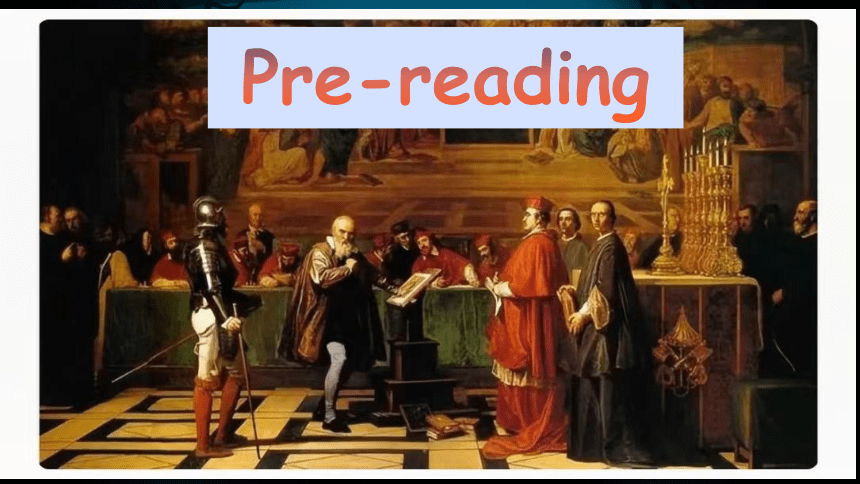
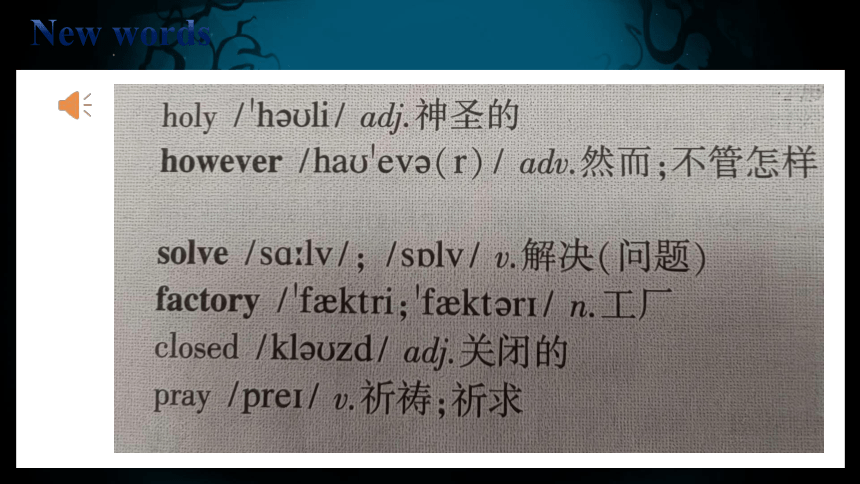


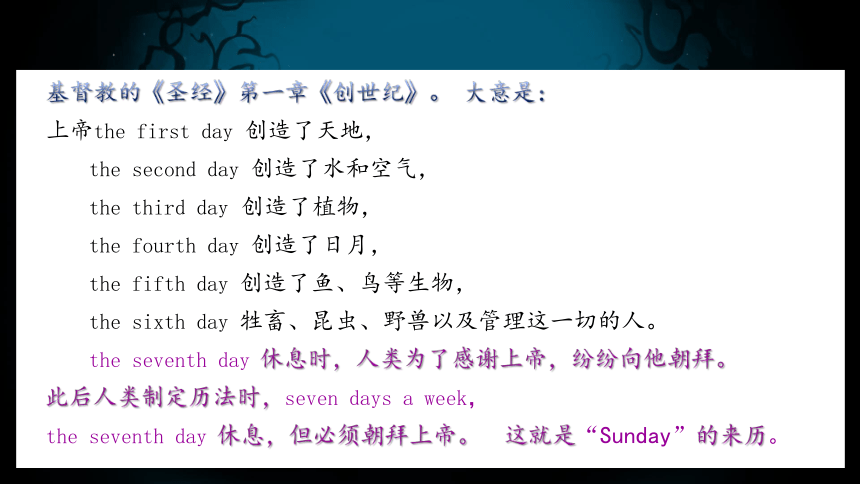
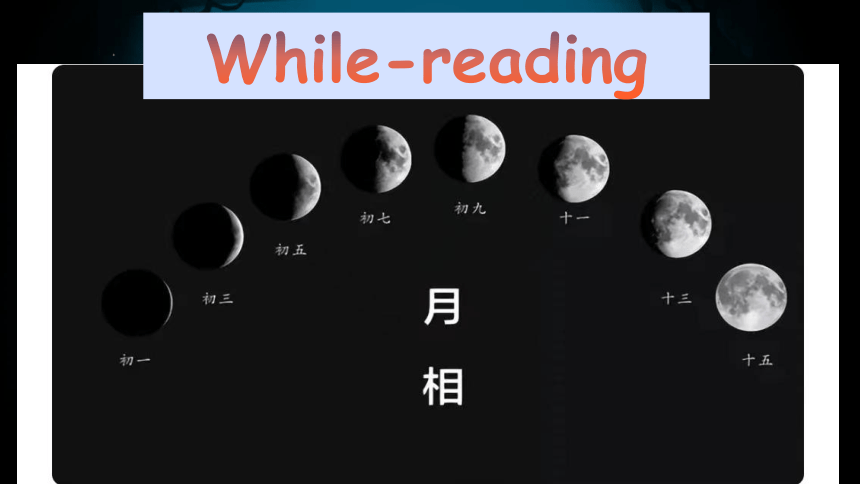
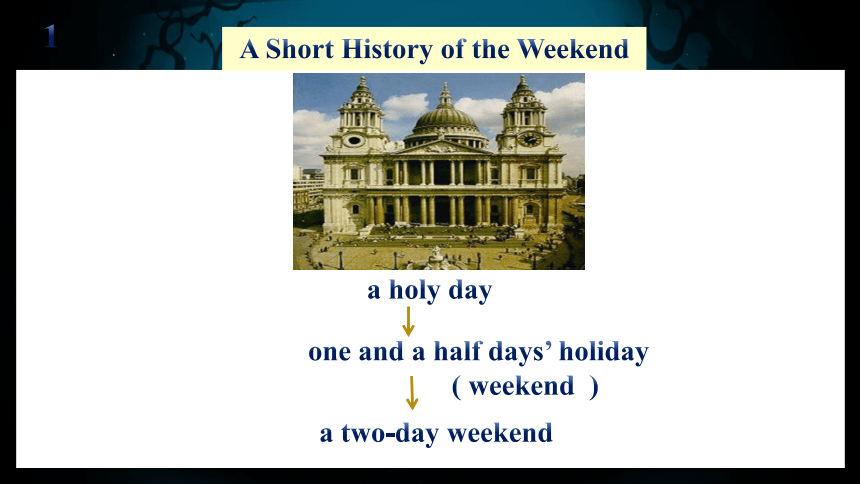
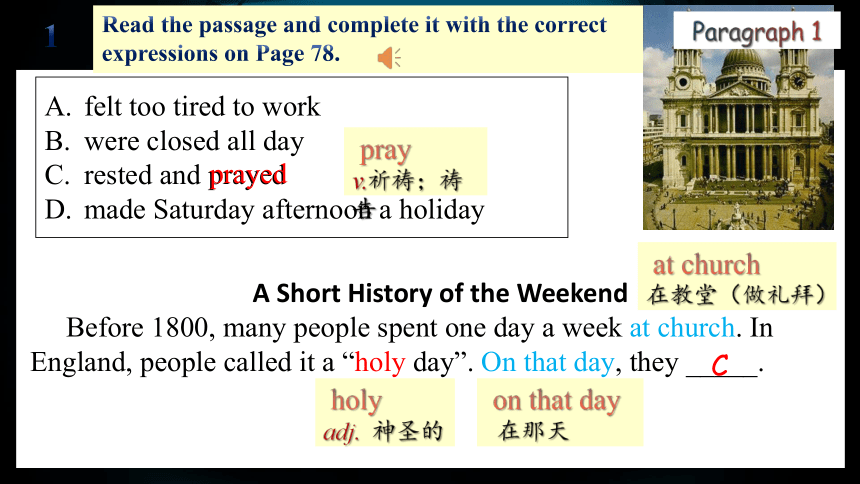
文档简介
Unit 3 Our Hobbies
Section D
Topic 3 What were you doing
at this time yesterday?
Pre-reading
New words
How many days are there in a week?
2. How many days are there in a weekend?
3. Do you know anything about
the weekend?
Lead-in
Watch a video
基督教的《圣经》第一章《创世纪》。 大意是:
上帝the first day 创造了天地,
the second day 创造了水和空气,
the third day 创造了植物,
the fourth day 创造了日月,
the fifth day 创造了鱼、鸟等生物,
the sixth day 牲畜、昆虫、野兽以及管理这一切的人。
the seventh day 休息时,人类为了感谢上帝,纷纷向他朝拜。
此后人类制定历法时,seven days a week,
the seventh day 休息,但必须朝拜上帝。 这就是“Sunday”的来历。
While-reading
1
A Short History of the Weekend
a holy day
one and a half days’ holiday
( weekend )
a two-day weekend
1
Read the passage and complete it with the correct expressions on Page 78.
felt too tired to work
were closed all day
rested and prayed
made Saturday afternoon a holiday
A Short History of the Weekend
Before 1800, many people spent one day a week at church. In England, people called it a “holy day”. On that day, they _____.
C
at church
在教堂(做礼拜)
on that day
在那天
pray
v.祈祷;祷告
prayed
holy
adj. 神圣的
Paragraph 1
Read Paragraph 1 and fill in the blanks.
a holy day
When :
Where:
Who :
What :
before 1800
at church
many people
rest and pray
Retell Paragraph 1 according to the information above.
1
Read the passage and complete it with the correct expressions on Page 78.
felt too tired to work
were closed all day
rested and prayed
made Saturday afternoon a holiday
In the early 1800s, Sunday was the “holy day”. However, many workers played games and had fun on that day. And then they _____ on Monday mornings. In the USA, workers called them “blue Mondays”.
A
too to
too...to...
太......而不能......
in the early 1800s
在19世纪早期
in the 1800’s=in the 1800’s
play games
做(玩)游戏
have fun=have a good time=enjoy oneself=play happily
玩得开心
on Monday mornings
每逢周一上午
Paragraph 2
1
Read the passage and complete it with the correct expressions on Page 78.
felt too tired to work
were closed all day
rested and prayed
made Saturday afternoon a holiday
To solve the problem of “blue Mondays”, the English _____ in 1874. At one o’clock, everyone stopped working. This was
the beginning of the idea of the weekend in England. By 1930, most American offices were closed on Saturday afternoons. By 1940, offices and factories in the USA _____ on Saturdays, and
the two-day weekend began.
D
made a holiday
make ... + 名词
使......成为......
stop doing sth.
停止正在做的某事
stop to do sth.
停下来做另一件事
the beginnnig of
......的开端
B
the two-day weekend
两天的周末
Paragraph 3
Read the rest paragraphs and find out the information about one and a half days’ holiday.
one and a half days’ holiday
in the early 1800s the USA
in 1874 England
in 1930 America
blue Mondays
workers too…to
Saturday afternoon holiday
the beginning of the weekend
0ffices were closed
on Saturday afternoon
Try to retell.
Read 1a again and match the following sentences.
1. Before 1800, people
2. In the early 1800s, many workers
3. In 1874, English workers
4. By 1930, most American workers
5. After 1940, American workers
a. had a two-day weekend.
b. didn’t work on Saturday afternoons.
c. rested and prayed on the “holy day”.
d. stopped working at one o’clock on Saturday afternoons.
e. played games on Sundays, and then they didn’t go to work on Monday mornings because they felt too tired.
c
e
d
b
a
Post-reading
2
Did you have a good time last Sunday? What were you doing at different times? Write a passage about it. The following words and phrases may help you.
Activity
Feeling
watch a movie
wash one’s clothes
play basketball
visit friends...
happy
excited
tired...
Last Sunday I was very busy. I got up at 7:00 a.m.. When Jim called me after breakfast, I was doing my homework. He wanted me to play with him. We played basketball happily from 10:00 to 12:00.
In the afternoon, I was washing my clothes from 2:00 to 2:30. From 3:00 to 4:00 I was reading comics. At 4:30 I went with my parents to see my grandparents. After we got back home, I helped my mother do the cooking. After supper, we all went out for a walk, and then we were watching TV from 8:00 to 9:00.
When I went to bed, I felt very tired. But I was happy.
You can write like this :
Language points
1. The workers felt too tired to work on Monday mornings.
工人在星期一上午感到太累而不能工作。
考点:
too...to... 意为“太.....而不能”,其中too是副词,后接形容词或副词;其中to是动词不定式符号,后接动词原形。
eg. kangkang got up too late to catch the school bus.
拓展:
too...to... 结构可以和so..that...以及not...enough to do 进行句型转换。
eg. My sister is too young to look after herself.
= My sister is so young that she can’t look after herself.
= My sister isn’t old enough to look after herself.
及时练习:
1. Mr. Black is _____ poor that he can’t buy a bike for his son.
A. too B. very C. so D. such
2. You’re never _____ old to learn a second language.
A. too B. very C. so D. such
3. —Will you go to the park with us this afternoon?
—I don’t think so. I’m _____ tired to go.
A. too B. very C. so D. enough
4. Miss Li is too short to get the pears. (改为同义句)
Miss Li is ______ short ______ she can’t get the apples.
= Miss Li isn’t ______ ______ to get the apples.
Language points
C
A
A
so that
tall enough
Language points
2. At one o’clock, everyone stopped working.
在一点钟,每一个人都停止工作了。
考点:
(1)stop doing sth. 停止做某事; stop to do sth. 停下来去做某事。
eg. You look tired. You’d better stop to have a rest.
The baby stopped crying when he saw his mother.
类似的用法还有:go on to do sth. 接着做另一件事;
go on doing sth. 继续做原来的事。
remember to do sth. 记住要做某事(未做);
remember doing sth. 记住已做了某事。
forget to do sth. 忘记要做某事(未做);
forget doing sth. 忘记已做了某事。
eg. I remembered seeing you last week.(已经见过)
Language points
2. At one o’clock, everyone stopped working.
在一点钟,每一个人都停止工作了。
考点:
(2)stop sb. from doing sth.
= keep sb. from doing sth.
= prevent sb. from doing sth. 阻止某人做某事。
eg. The heavy rain stopped us (from) getting to school on time.
= The heavy rain kept us from getting to school on time.
= The heavy rain prevented us (from) getting to school on time.
及时练习:1. You look so tired. You’d better stop _____.
A. lying down B. lie down C. to lie down D. lied down
2. You must stop _____. My sister is sleeping.
A. talking B. talk C. to talk D. talks
C
A
Language points
3. This was the beginning of the idea of the weekend in England.
这是周末的想法在英国的开始。
考点:
beginning 是 begin 的动名词(双写n+ing),意为“开始,开端”。
the beginning of... 表示“......的开始/开端”。
eg. Sunday is the beginning of a week.
An English song is the beginning of our class.
拓展:at the beginning of... 意为“在......的开始”;
from beginning to end 意为“从头到尾”。
eg. Mr. Zhou helped us from beginning to end.
及时练习:
At the ________ (begin) of the class, we often sing a song with our teacher.
beginning
Language points
4. By 1940, offices and factories in the USA were closed on Saturdays, and the two-day weekend began. 到1940年,每个的机关部门和工厂每逢星期六就关闭,于是双休日的周末就开始了。
考点:
(1)by 1940意为“到1940年”。介词by 的用法常见的有:
by+交通工具(无冠词);by the way顺便问一下;by oneself = alone独自地;leave sb. by oneself/alone 把某人单独留下;teach sth. by oneself自学某物等。
eg. I often go to school by bike.
By the way, what time do you get up?
Kangkang taught Japanese by himself last year.
(2)句中的two-day是一个合成形容词,由数词,“-”和单数名词构成,常用来修饰名词作定语,不作表语。
eg. I have an eight-year-old brother.
及时练习:
1. Next week, we will have _____ holiday.
A.a three-days B. three-day
C. a three-day D. a three day
2. _____, where shall we meet tomorrow morning?
A. On the way B. By the way
C. In the way D. To the way
3. —How does Kangkang usually go to school?
—He usually goes to school _____.
A. by bus B. by foot C. on bus D. ina bike
Language points
C
B
A
Grammar
Past Continuous
Read through Sections A — C and fill in the blanks with the correct words.
Summary
I _____ _________ a shower at this time yesterday.
Many people ______ _______ together in their warm homes.
________ you playing computer games?
Yes, I was. / No, I wasn’t.
What _______ you ________ at this time yesterday?
I ______ _______ some clothes.
was taking/having
were getting
Were
were
doing
was washing
I agree. / I agree______ you. / I don’t ______.
I think ___. / I don’t think____.
I think it is just ______. I think he _____ ______ brave.
______ the line, please. You are quite _______.
Functions
with
so
so
so-so
is very
Hold
right
agree
( ) 1. The singer was very famous _____ in Shanghai.
A. in the 1960s B. in 1960s C. in 1960’s D. in the 1960
( ) 2. I saw Kangkang in the park. He _____ on the grass and
talking with Jane.
A. sat B. sits C. is sitting D. was sitting
( ) 3. As we know, ____ 1995, the ____ weekend began in China.
A. in; two-days B. on; two-days
C. by; two days D. in; two-day
Choose the best answer.
Exercises
A
D
D
summary
1. We learn the phrases:
低声地
经过
落下
害怕做……
温暖某人
第四根火柴
把某人搂在怀里
in a low voice
pass by
fall down
be afraid to do
warm sb. up
a fourth match
hold sb. in one’s arms
Homework
1. Read 1a.
2. Recite the new words and expressions.
3. Finish Section D in your workbook.
4. Preview Section A in next topic.
5. Write a passage about My Last Sunday.
Section D
Topic 3 What were you doing
at this time yesterday?
Pre-reading
New words
How many days are there in a week?
2. How many days are there in a weekend?
3. Do you know anything about
the weekend?
Lead-in
Watch a video
基督教的《圣经》第一章《创世纪》。 大意是:
上帝the first day 创造了天地,
the second day 创造了水和空气,
the third day 创造了植物,
the fourth day 创造了日月,
the fifth day 创造了鱼、鸟等生物,
the sixth day 牲畜、昆虫、野兽以及管理这一切的人。
the seventh day 休息时,人类为了感谢上帝,纷纷向他朝拜。
此后人类制定历法时,seven days a week,
the seventh day 休息,但必须朝拜上帝。 这就是“Sunday”的来历。
While-reading
1
A Short History of the Weekend
a holy day
one and a half days’ holiday
( weekend )
a two-day weekend
1
Read the passage and complete it with the correct expressions on Page 78.
felt too tired to work
were closed all day
rested and prayed
made Saturday afternoon a holiday
A Short History of the Weekend
Before 1800, many people spent one day a week at church. In England, people called it a “holy day”. On that day, they _____.
C
at church
在教堂(做礼拜)
on that day
在那天
pray
v.祈祷;祷告
prayed
holy
adj. 神圣的
Paragraph 1
Read Paragraph 1 and fill in the blanks.
a holy day
When :
Where:
Who :
What :
before 1800
at church
many people
rest and pray
Retell Paragraph 1 according to the information above.
1
Read the passage and complete it with the correct expressions on Page 78.
felt too tired to work
were closed all day
rested and prayed
made Saturday afternoon a holiday
In the early 1800s, Sunday was the “holy day”. However, many workers played games and had fun on that day. And then they _____ on Monday mornings. In the USA, workers called them “blue Mondays”.
A
too to
too...to...
太......而不能......
in the early 1800s
在19世纪早期
in the 1800’s=in the 1800’s
play games
做(玩)游戏
have fun=have a good time=enjoy oneself=play happily
玩得开心
on Monday mornings
每逢周一上午
Paragraph 2
1
Read the passage and complete it with the correct expressions on Page 78.
felt too tired to work
were closed all day
rested and prayed
made Saturday afternoon a holiday
To solve the problem of “blue Mondays”, the English _____ in 1874. At one o’clock, everyone stopped working. This was
the beginning of the idea of the weekend in England. By 1930, most American offices were closed on Saturday afternoons. By 1940, offices and factories in the USA _____ on Saturdays, and
the two-day weekend began.
D
made a holiday
make ... + 名词
使......成为......
stop doing sth.
停止正在做的某事
stop to do sth.
停下来做另一件事
the beginnnig of
......的开端
B
the two-day weekend
两天的周末
Paragraph 3
Read the rest paragraphs and find out the information about one and a half days’ holiday.
one and a half days’ holiday
in the early 1800s the USA
in 1874 England
in 1930 America
blue Mondays
workers too…to
Saturday afternoon holiday
the beginning of the weekend
0ffices were closed
on Saturday afternoon
Try to retell.
Read 1a again and match the following sentences.
1. Before 1800, people
2. In the early 1800s, many workers
3. In 1874, English workers
4. By 1930, most American workers
5. After 1940, American workers
a. had a two-day weekend.
b. didn’t work on Saturday afternoons.
c. rested and prayed on the “holy day”.
d. stopped working at one o’clock on Saturday afternoons.
e. played games on Sundays, and then they didn’t go to work on Monday mornings because they felt too tired.
c
e
d
b
a
Post-reading
2
Did you have a good time last Sunday? What were you doing at different times? Write a passage about it. The following words and phrases may help you.
Activity
Feeling
watch a movie
wash one’s clothes
play basketball
visit friends...
happy
excited
tired...
Last Sunday I was very busy. I got up at 7:00 a.m.. When Jim called me after breakfast, I was doing my homework. He wanted me to play with him. We played basketball happily from 10:00 to 12:00.
In the afternoon, I was washing my clothes from 2:00 to 2:30. From 3:00 to 4:00 I was reading comics. At 4:30 I went with my parents to see my grandparents. After we got back home, I helped my mother do the cooking. After supper, we all went out for a walk, and then we were watching TV from 8:00 to 9:00.
When I went to bed, I felt very tired. But I was happy.
You can write like this :
Language points
1. The workers felt too tired to work on Monday mornings.
工人在星期一上午感到太累而不能工作。
考点:
too...to... 意为“太.....而不能”,其中too是副词,后接形容词或副词;其中to是动词不定式符号,后接动词原形。
eg. kangkang got up too late to catch the school bus.
拓展:
too...to... 结构可以和so..that...以及not...enough to do 进行句型转换。
eg. My sister is too young to look after herself.
= My sister is so young that she can’t look after herself.
= My sister isn’t old enough to look after herself.
及时练习:
1. Mr. Black is _____ poor that he can’t buy a bike for his son.
A. too B. very C. so D. such
2. You’re never _____ old to learn a second language.
A. too B. very C. so D. such
3. —Will you go to the park with us this afternoon?
—I don’t think so. I’m _____ tired to go.
A. too B. very C. so D. enough
4. Miss Li is too short to get the pears. (改为同义句)
Miss Li is ______ short ______ she can’t get the apples.
= Miss Li isn’t ______ ______ to get the apples.
Language points
C
A
A
so that
tall enough
Language points
2. At one o’clock, everyone stopped working.
在一点钟,每一个人都停止工作了。
考点:
(1)stop doing sth. 停止做某事; stop to do sth. 停下来去做某事。
eg. You look tired. You’d better stop to have a rest.
The baby stopped crying when he saw his mother.
类似的用法还有:go on to do sth. 接着做另一件事;
go on doing sth. 继续做原来的事。
remember to do sth. 记住要做某事(未做);
remember doing sth. 记住已做了某事。
forget to do sth. 忘记要做某事(未做);
forget doing sth. 忘记已做了某事。
eg. I remembered seeing you last week.(已经见过)
Language points
2. At one o’clock, everyone stopped working.
在一点钟,每一个人都停止工作了。
考点:
(2)stop sb. from doing sth.
= keep sb. from doing sth.
= prevent sb. from doing sth. 阻止某人做某事。
eg. The heavy rain stopped us (from) getting to school on time.
= The heavy rain kept us from getting to school on time.
= The heavy rain prevented us (from) getting to school on time.
及时练习:1. You look so tired. You’d better stop _____.
A. lying down B. lie down C. to lie down D. lied down
2. You must stop _____. My sister is sleeping.
A. talking B. talk C. to talk D. talks
C
A
Language points
3. This was the beginning of the idea of the weekend in England.
这是周末的想法在英国的开始。
考点:
beginning 是 begin 的动名词(双写n+ing),意为“开始,开端”。
the beginning of... 表示“......的开始/开端”。
eg. Sunday is the beginning of a week.
An English song is the beginning of our class.
拓展:at the beginning of... 意为“在......的开始”;
from beginning to end 意为“从头到尾”。
eg. Mr. Zhou helped us from beginning to end.
及时练习:
At the ________ (begin) of the class, we often sing a song with our teacher.
beginning
Language points
4. By 1940, offices and factories in the USA were closed on Saturdays, and the two-day weekend began. 到1940年,每个的机关部门和工厂每逢星期六就关闭,于是双休日的周末就开始了。
考点:
(1)by 1940意为“到1940年”。介词by 的用法常见的有:
by+交通工具(无冠词);by the way顺便问一下;by oneself = alone独自地;leave sb. by oneself/alone 把某人单独留下;teach sth. by oneself自学某物等。
eg. I often go to school by bike.
By the way, what time do you get up?
Kangkang taught Japanese by himself last year.
(2)句中的two-day是一个合成形容词,由数词,“-”和单数名词构成,常用来修饰名词作定语,不作表语。
eg. I have an eight-year-old brother.
及时练习:
1. Next week, we will have _____ holiday.
A.a three-days B. three-day
C. a three-day D. a three day
2. _____, where shall we meet tomorrow morning?
A. On the way B. By the way
C. In the way D. To the way
3. —How does Kangkang usually go to school?
—He usually goes to school _____.
A. by bus B. by foot C. on bus D. ina bike
Language points
C
B
A
Grammar
Past Continuous
Read through Sections A — C and fill in the blanks with the correct words.
Summary
I _____ _________ a shower at this time yesterday.
Many people ______ _______ together in their warm homes.
________ you playing computer games?
Yes, I was. / No, I wasn’t.
What _______ you ________ at this time yesterday?
I ______ _______ some clothes.
was taking/having
were getting
Were
were
doing
was washing
I agree. / I agree______ you. / I don’t ______.
I think ___. / I don’t think____.
I think it is just ______. I think he _____ ______ brave.
______ the line, please. You are quite _______.
Functions
with
so
so
so-so
is very
Hold
right
agree
( ) 1. The singer was very famous _____ in Shanghai.
A. in the 1960s B. in 1960s C. in 1960’s D. in the 1960
( ) 2. I saw Kangkang in the park. He _____ on the grass and
talking with Jane.
A. sat B. sits C. is sitting D. was sitting
( ) 3. As we know, ____ 1995, the ____ weekend began in China.
A. in; two-days B. on; two-days
C. by; two days D. in; two-day
Choose the best answer.
Exercises
A
D
D
summary
1. We learn the phrases:
低声地
经过
落下
害怕做……
温暖某人
第四根火柴
把某人搂在怀里
in a low voice
pass by
fall down
be afraid to do
warm sb. up
a fourth match
hold sb. in one’s arms
Homework
1. Read 1a.
2. Recite the new words and expressions.
3. Finish Section D in your workbook.
4. Preview Section A in next topic.
5. Write a passage about My Last Sunday.
同课章节目录
- Unit 1 Playing Sports
- Topic 1 I'm going to play basketball.
- Topic 2 I'll kick you the ball again.
- Topic 3 The school sports meet is coming.
- Unit 2 Keeping Healthy
- Topic 1 You should brush your teeth twice a day.
- Topic 2 I must ask him to give up smoking.
- Topic 3 Must we exercise to prevent the flu?
- Unit 3 Our Hobbies
- Topic 1 What's your hobby?
- Topic 2 What sweet music!
- Topic 3 What were you doing at this time yesterday
- Unit 4 Our World
- Topic 1 What's the strongest animal on the farm?
- Topic 2 How can we protect ourselves from the eart
- Topic 3 The Internet makes the world smaller.
